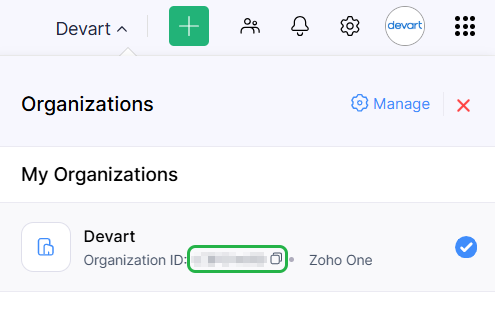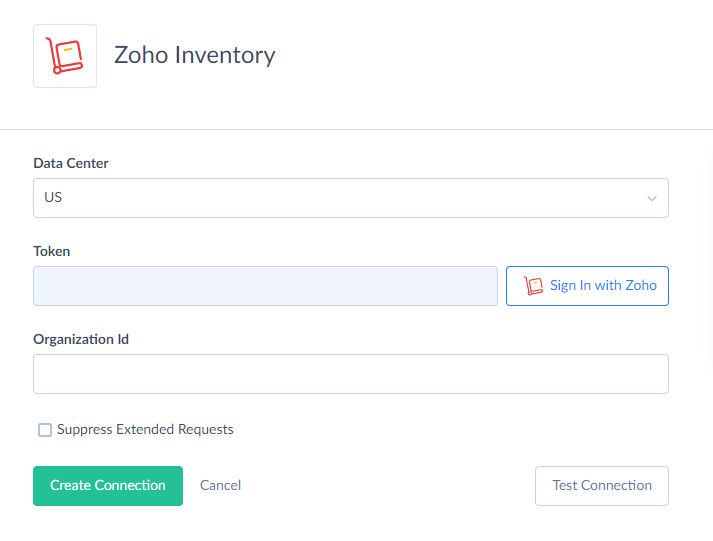Zoho Inventory
Zoho Inventory is a cloud inventory management software for growing businesses with order management, end-to-end tracking, warehouse management, etc., developed by ZOHO Corporation.
Data Integration: Skyvia supports importing data to and from Zoho Inventory, exporting Zoho Inventory data to CSV files, replicating Zoho Inventory data to relational databases, and synchronizing Zoho Inventory data with other cloud apps and relational databases.
Backup: Skyvia Backup supports Zoho Inventory.
Query: Skyvia Query supports Zoho Inventory.
Establishing Connection
To create a connection to Zoho Inventory, select your Data Center, sign in with Zoho, and specify your Organization ID.
Getting Credentials
Organization ID
To get your Organization ID:
-
Log in to your Zoho Inventory account.
-
Click your Organization Name at the top right.

-
Copy your Organization ID.
Creating Connection

To create a connection to Zoho Inventory, perform the following steps:
- Select a Zoho Inventory data center location from the Data Center dropdown.
- Enter your Organization Id.
- Click Sign In with Zoho and enter your Zoho login credentials.
- Click the Create Connection.
Additional Connection Parameters
Suppress Extended Requests
For some objects, Zoho Inventory API returns only part of the fields when querying multiple records. To query values of lacking fields, Skyvia performs additional extended requests. Such API requests can be performed for each record of such object. However, this can decrease performance and significantly increase the number of API calls used.
The additional fields are the following:
| OBJECT | FIELD |
|---|---|
| Bills | LineItems |
| Bundles | LineItems |
| CompositeItems | MappedItems |
| Contacts | BillAddr_, ShipAddr_, Twitter, Facebook, Notes |
| CreditNotes | LineItems |
| Invoices | LineItems |
| Items | CustomFields, CustomFieldHash, Batches |
| ItemAdjustments | LineItems |
| Packages | LineItems |
| Pricebooks | PricebookItems |
| PurchaseOrders | LineItems |
| PurchaseReceives | BillAddr_, ShipAddr_, ContactCategory, SubmittedDate, SubmittedBy, SubmittedByName, SubmittedByEmail, SubmittedByPhotoUrl, SubmitterId, ApproverId, ApprovalReason, ApproversList, CurrencyId, CurrencyCode, CurrencySymbol, IsInclusiveTax, ContactPersons, Documents, IsBilled, IsPOMarkedAsReceived, PaymentTerms, PaymentTermsLabel, Bills, Notes, LineItems, IsTrackingSupported, TrackingNumber, TrackingLink, ExpectedDeliveryDate, ShipmentDeliveredDate, Carrier, DeliveryMethod, DeliveryMethodId, TrackingStatuses, CustomFields, CustomFieldHash, CreatedById, LastModifiedById |
| SalesOrders | LineItems |
| SalesReturns | LineItems |
| ShipmentOrders | BillAddr_, ShipAddr_, SalesOrderDate, SalesorderFulfilmentStatus, ShipmentStatus, DetailedStatus, StatusMessage, TrackingCarrierCode, Service, DeliveryDays, SourceId, SourceName, DeliveryGuarantee, ReferenceNumber, CustomerId, ContactPersons, CurrencyId, CurrencyCode, CurrencySymbol, ExchangeRate, Discount, IsDiscountBeforeTax, DiscountType, EstimateId, DeliveryMethod, DeliveryMethodId, TrackingLink, LastTrackingUpdateDate, ExpectedDeliveryDate, ShipmentDeliveredDate, MultipieceShipments, ShipmentType, IsTrackingEnabled, IsFormsAvailable, IsEmailNotificationEnabled, TrackingStatuses, Invoices, LineItems, SubTotal, TaxTotal, Total, Taxes, PricePrecision, IsEmailed, Notes, CustomFields, CustomFieldHash, TemplateId, TemplateName, TemplateType, Packages, Documents, AssociatedPackagesCount, CreatedById, LastModifiedById |
| TransferOrders | LineItems, CustomFields, CustomFieldHash |
To reduce the number of API calls, you can select the Suppress Extended Requests checkbox.
Connector Specifics
Object Peculiarities
ShipmentOrders
This objects requires mapping the SalesOrderId and the PackageIds fields for the Update action. You can list several values, separated by commas when mapping the PackageIds fields.
Auto-generation of Numbers in Zoho Inventory UI
Zoho Inventory offers auto-generation of numbers when creating records in transaction objects, like Invoices, TransferOrders, SalesOrders, CreditNotes, and others. If this feature is enabled, it may cause errors when performing the Insert action in Import and Data Flow, or the Restore operation in Backup.
Backup and Restore
When you restore data in the Invoices, TransferOrders, SalesOrders, CreditNotes and other transaction objects, Skyvia inserts all the backed-up records into the source, including the number field values. Thus, when the auto-generation is enabled, Skyvia tries to insert the records with the existing number. Zoho Inventory returns an error trying to generate a new record number for such records automatically. To avoid errors while restoring records of transaction objects, disable the auto-generation of numbers for the objects you restore.
Import or Data Flow
If you insert records into the Invoices, TransferOrders, SalesOrders, CreditNotes and other transaction objects by Import or Data Flow, and map the number fields while the auto-generation is enabled, Zoho Inventory returns an error trying to generate a new record number for such records automatically. To avoid errors, remove mapping for the fields whose values are auto-generated or disable the auto-generation for the object you insert data into.
Filtering Specifics
The UpdatedDate field in the Items, SalesOrders, Contacts, Invoices, PurchaseOrders, and Bills objects supports filters with >= and > operators.
Use these filters to improve performance and save API calls. You can use filters with other fields or operators, but it may increase API call usage.
Nested Objects
The CustomFields and LineItems fields store complex structured data in JSON format. You can use our Nested Objects mapping feature in the Import integrations to insert or update the nested values in such fields. Select the Separate Tables for the Unwind Nested Objects option when using the new replication runtime to replicate the nested data into separate tables.
The following objects contain these fields:
| OBJECTS | FIELDS |
|---|---|
| Bills, Invoices, ItemAdjustments, ItemGroups, PurchaseOrders, SalesOrders, TransferOrders | LineItems |
| Bills, CompositeItems, Contacts, CreditNotes, CustomerPayments, Invoices, Items, Organizations, Packages, PurchaseOrders, PurchaseReceives, SalesOrders, ShipmentOrders, TransferOrders | CustomFields |
| ItemGroups | Items, Attributes, CustomFields |
Complex Structured Data
Some of the Zoho Inventory tables store complex structured data. These are the following tables: Invoices, Bills, ItemAdjustments, PurchaseOrders, SalesOrders, TransferOrders. For example, an invoice or a purchase order can have several lines. Skyvia represents this information in such tables as a JSON field LineItems. Here is an example of the LineItems field value from the Invoice object:
[
{
"documents": [],
"item_id": "369175000000122053",
"is_combo_product": false,
"account_id": "369175000000000388",
"account_name": "Sales",
"sku": "",
"salesorder_item_id": "",
"project_id": "",
"time_entry_ids": [],
"expense_id": "",
"expense_receipt_name": "",
"name": "ServiceItem",
"description": "sample description",
"item_order": 0,
"bcy_rate": 148.92,
"rate": 148.92,
"quantity": 1,
"unit": "kg",
"discount": 0,
"tax_id": "369175000000044076",
"tax_name": "Tax_our",
"tax_type": "tax",
"tax_percentage": 15,
"item_total": 148.92,
"tags": [
{
"tag_option_id": "369175000000085213",
"is_tag_mandatory": false,
"tag_name": "testTag",
"tag_id": "369175000000000333",
"tag_option_name": "option1"
}
],
"item_custom_fields": [],
"item_type": "sales_and_purchases"
}
]
For user convenience, data stored in the lines is also available as separate records in objects with *Lineitems suffix in their names (InvoiceLineItems, BillLineItems, etc). Since the objects with the *Lineitems suffix in their names are read-only, they can not be used in Synchronization and as a Target in Import. To make changes to the line in a Zoho Inventory object, you need to have your updated line data in a JSON format and map it to the LineItems field.
The objects with the *Lineitems suffix in their names can be found in Backup. You cannot restore data to these objects, as they are read-only. Instead, make changes to the corresponding main (suffixless) objects and those changes will be applied to the objects with *Lineitems suffix automatically.
DML Operations Support
| Operations | Objects |
|---|---|
| INSERT, UPDATE, DELETE | Bills, ContactPersons, Contacts, Currency, CustomerPayments, InvoiceCreditsApplied, Invoices, ItemGroups, Items, Package, PurchaseOrders, SalesOrders, TaxAuthorities, Taxes, Users, PurchaseReceives, ShipmentOrders |
| INSERT, UPDATE | Organizations |
| INSERT, DELETE | TransferOrders, ItemAdjustments, InvoiceCreditsApplied |
Zoho Inventory API Calls Limit
By default, Zoho Inventory has a 1000 API calls per day and 60 API calls per minute limit. Performing backup, replication, or querying all the data from complex objects may quickly use all the API calls available. For example, querying LineItems field values uses additional requests.
Supported Actions
Skyvia supports all the common actions for Zoho Inventory.